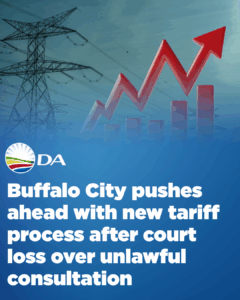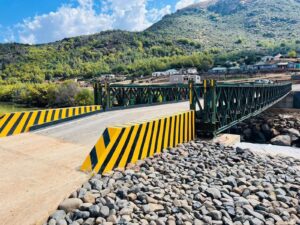The Eastern Cape is entering one of the most dangerous periods of the year, when the risk of fires, floods, and motor vehicle accidents increases, with a provincial firefighting system that has steadily deteriorated year on year.
The Democratic Alliance is demanding an urgent, province-wide emergency plan to restore firefighting capacity and ensure that every community has access to a functional and roadworthy fleet.
Three years ago, the DA warned that the provincial government was woefully unprepared for disasters, with only 68 functional fire trucks across the province, when the requirement to meet basic safety standards is 168.
See response here.
Instead of closing the gap, the provincial fleet has collapsed even further. In response to parliamentary questions from the DA, COGTA MEC, Zolile Williams, confirmed that the province has 71 fire trucks, but only 53 are roadworthy, and just 50 are functional.
This is 18 fewer than in 2022, despite repeated warnings and rising disaster risks.
See response here.
Fire trucks do far more than extinguish fires. They are essential for flood response, road accidents, hazardous incidents, and rescue operations. When these vehicles are broken or unavailable, entire communities are left without the frontline protection required to save lives.
Williams confirmed that large parts of the province have no fire trucks at all. Families living in rural and small-town areas face the greatest danger. When a home, school, or business burns in places like Hamburg, Keiskammahoek, Centane, Bedford, or Dordrecht, help simply does not arrive in time because there are no operational fire trucks stationed there.
The Chris Hani District has no working fire trucks at all and relies solely on small bakkie units that cannot respond to structural fires.
Buffalo City, with seven trucks, and Nelson Mandela Bay, with seventeen, are the only municipalities remotely close to adequate readiness. The rest of the province is dangerously under-resourced, despite legal obligations for regular fleet assessments and replacement cycles.
The provincial government admits that municipalities are not complying with SANS 10090 or the required replacement cycles, which range from 10 years for off-road vehicles to 15 years for pumping appliances. The result is a system that is allowed to deteriorate until it collapses.
At the same time, the province is still dealing with more than R5.2 billion in flood-related damage.
The DA will be tabling an urgent motion for a full provincial readiness report, including the status of every fire truck, the age of each vehicle, municipalities’ compliance with safety standards, and a costed plan to restore capacity before peak risk.
We will also pursue the establishment of a unified disaster response framework that clearly defines responsibilities between COGTA, district municipalities, and local municipalities, to end the chronic finger-pointing that leaves residents stranded in emergencies.
The people of the Eastern Cape deserve the comfort of knowing that when a fire breaks out, help will arrive and that government has done everything possible to protect lives and homes.
The province needs leadership that prioritises safety, competence, and accountability. The DA remains committed to building that future and to ensuring that every community is protected with dignity and fairness.








